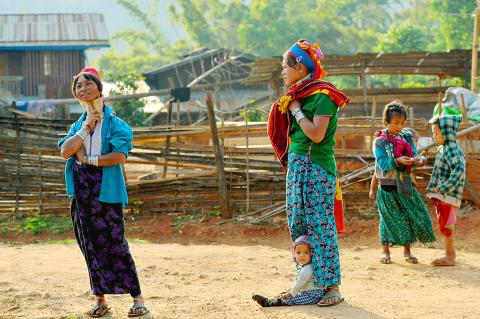Wearing a stack of bronze neck coils — a sign of beauty for her Kayan tribe — Mu Par dreams of a time when all “long-necked” women can return to Myanmar from Thailand where they are a tourist attraction.
For years Kayan women and girls have been driven across the border by poverty and conflict to earn money posing in holidaymakers’ pictures in purpose-built Thai villages decried by rights campaigners as “human zoos.”
Now several have returned to their remote native Panpet area in Kayah state, Myanmar, with an entrepreneurial plan to reverse the flow of departures as their once junta-ruled homeland emerges from decades of solitude.

Photo: AFP/Phyo Hein Kyaw
Mu Par came home just a few months ago having saved enough money after 14 years working in Thailand.
She now runs one of a dozen neat little shacks selling locally-made wooden dolls, scarves and individual bronze neck rings — giving tourists a more ethical window into their unique culture. Lining up a neat row of handmade “long-neck dolls” at a new craft market, Mu Par hopes to entice tourists to her eastern Myanmar homeland, and provide for her four children, aged between four and 15.
“In Myanmar my children can attend school and also I am happy to be among my relatives,” the 33-year-old told AFP, as a handful of tourists milled through the area.
Once the preserve of intrepid travelers as it languished under junta rule, Myanmar is now a hot new tourist draw.
Arrivals have doubled in the past five years and numbers are expected to surge under a new government led by Aung San Suu Kyi’s pro-democracy party.
Much of tiny Kayah state was off limits to foreigners until recently.
Authorities now hope the region’s emerald hills and languid waterways will become the country’s next top travel destination.
Mu Par and her neighbors from Panpet’s cluster of five hamlets grouped together to build the market.
They share the profits from the 5,000 kyat (US$4) visitor entrance fee. “If we can get many tourists here, we want all the Kayan girls in Thailand to come back,” she told AFP.
CONTROVERSY AND CULTURE
From as young as five years old, Kayan girls are given up to ten neck rings to wear, they then add a new one approximately every year until adulthood.
The practice, which gives them a giraffe-like appearance, painfully compresses their shoulders and collarbones, rather than actually stretching their necks.
A grown woman can wear as many as 25 rings, weighing a total of five kilos.
One local legend suggests women began wearing the rings to protect themselves against tigers, who once roamed the region in large numbers and bite the necks of their prey.
Men in the village also used to wear face-shaped masks on the backs of their heads in a bid to ward off tiger ambushes, according to local people, although the practice has since died out.
Fewer women now wear the coils, which force them to keep looking straight ahead. Families often cannot afford the costly, handcrafted rings, while many young girls feel they are an impediment to getting a job outside of their region. The women can remove their rings with the help of a specialist and their shoulders and collarbones can eventually return to normal, depending on the age when they are taken off.
Several dozen women and girls still wear the traditional bands, including those at the new handicraft market in Panpet.
Until recently they spent much of the year in Thailand, earning around 3,000 baht (US$90) a month in the tourist attraction villages, where most of the money goes to Thai tour agents. “Asking them to pose for photographs for money is acting like they are in a human zoo,” said Phyoe Wai Yar Zar a Myanmar tourism official.
“Instead (in their home villages) people can buy their products like food, handmade crafts and souvenirs to support them.”

Google unveiled an artificial intelligence tool Wednesday that its scientists said would help unravel the mysteries of the human genome — and could one day lead to new treatments for diseases. The deep learning model AlphaGenome was hailed by outside researchers as a “breakthrough” that would let scientists study and even simulate the roots of difficult-to-treat genetic diseases. While the first complete map of the human genome in 2003 “gave us the book of life, reading it remained a challenge,” Pushmeet Kohli, vice president of research at Google DeepMind, told journalists. “We have the text,” he said, which is a sequence of

On a harsh winter afternoon last month, 2,000 protesters marched and chanted slogans such as “CCP out” and “Korea for Koreans” in Seoul’s popular Gangnam District. Participants — mostly students — wore caps printed with the Chinese characters for “exterminate communism” (滅共) and held banners reading “Heaven will destroy the Chinese Communist Party” (天滅中共). During the march, Park Jun-young, the leader of the protest organizer “Free University,” a conservative youth movement, who was on a hunger strike, collapsed after delivering a speech in sub-zero temperatures and was later hospitalized. Several protesters shaved their heads at the end of the demonstration. A

In August of 1949 American journalist Darrell Berrigan toured occupied Formosa and on Aug. 13 published “Should We Grab Formosa?” in the Saturday Evening Post. Berrigan, cataloguing the numerous horrors of corruption and looting the occupying Republic of China (ROC) was inflicting on the locals, advocated outright annexation of Taiwan by the US. He contended the islanders would welcome that. Berrigan also observed that the islanders were planning another revolt, and wrote of their “island nationalism.” The US position on Taiwan was well known there, and islanders, he said, had told him of US official statements that Taiwan had not

We have reached the point where, on any given day, it has become shocking if nothing shocking is happening in the news. This is especially true of Taiwan, which is in the crosshairs of the Chinese Communist Party (CCP), uniquely vulnerable to events happening in the US and Japan and where domestic politics has turned toxic and self-destructive. There are big forces at play far beyond our ability to control them. Feelings of helplessness are no joke and can lead to serious health issues. It should come as no surprise that a Strategic Market Research report is predicting a Compound